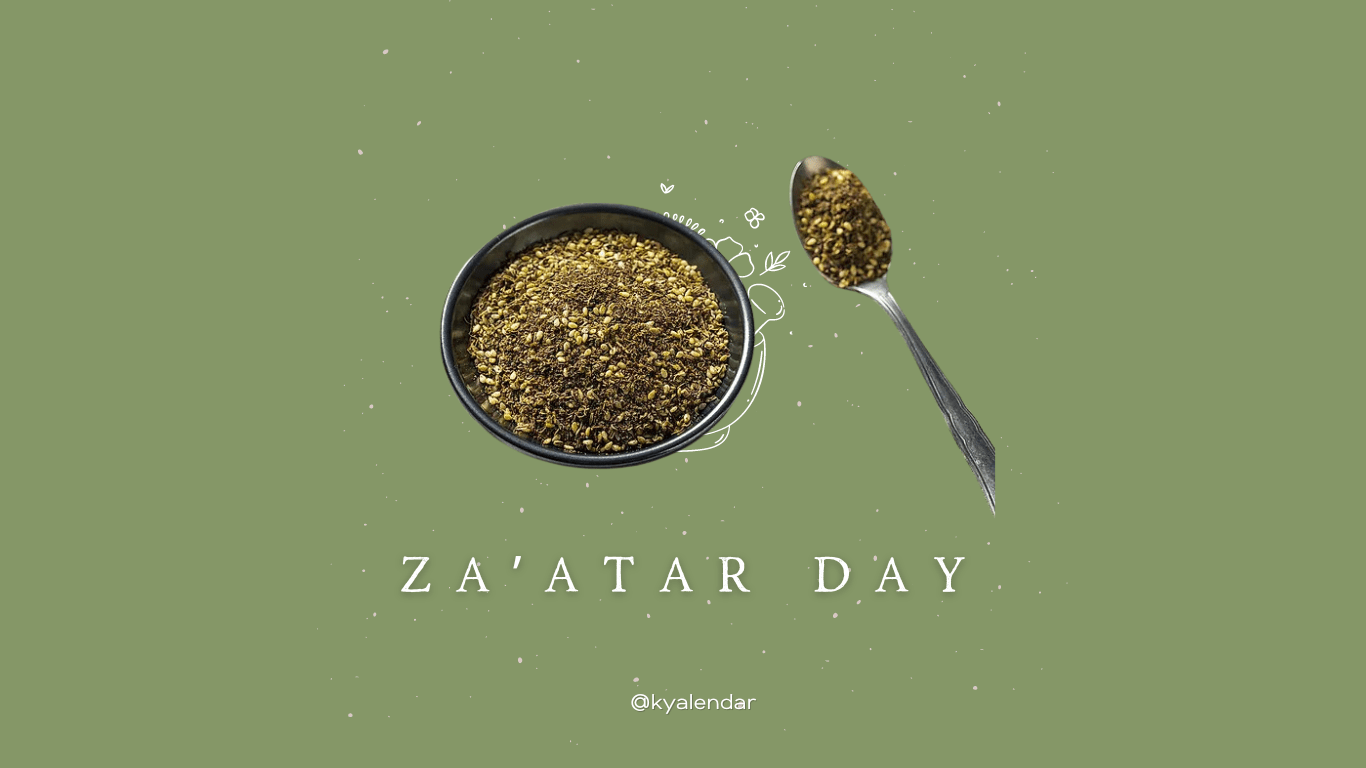
- This event has passed.
Za’atar Day
September 23

Za’atar Day, celebrated on September 16th each year, is dedicated to honouring za’atar, a traditional Middle Eastern spice blend that has captivated taste buds for centuries. This day highlights the unique flavours of za’atar, its cultural significance, and its versatility in culinary applications.
What is Za’atar?
Za’atar is a versatile spice blend with deep roots in Middle Eastern cuisine. Its name can refer both to the spice mixture and the herb thyme, which is a key component of many za’atar blends. The blend typically consists of dried thyme, sumac, sesame seeds, and salt, though regional variations might include additional spices such as cumin or coriander.
The flavour profile of za’atar is distinctive: it combines the earthy, herbal notes of thyme with the tangy, lemony taste of sumac and the nutty crunch of sesame seeds. This combination creates a harmonious and aromatic seasoning that enhances a wide range of dishes.
The Origins and Cultural Significance
Za’atar has been a staple in Middle Eastern cooking for centuries. Its origins are rooted in ancient agricultural practices where the herbs and spices used in the blend were commonly grown and harvested. The name “za’atar” itself can be traced back to the Arabic word for thyme, which reflects the herb’s integral role in the blend.
In Middle Eastern cultures, za’atar is more than just a seasoning; it’s a symbol of hospitality and tradition. It is often used as a dip for bread, mixed with olive oil, or sprinkled over dishes to add flavour. Za’atar is also featured in various regional recipes, from za’atar-coated chicken to manakish, a type of flatbread topped with the spice blend.
Celebrating Za’atar Day
Za’atar Day is an opportunity to explore and appreciate the rich flavours and cultural significance of this unique spice blend. Here’s how you can celebrate this special day:
- Cook with Za’atar: Incorporate za’atar into your cooking to experience its distinctive flavour. You can use it to season meats, vegetables, or grains, or mix it into dressings and sauces. Try making traditional dishes like za’atar flatbreads or roasted vegetables with za’atar seasoning.
- Try New Recipes: Experiment with recipes that highlight za’atar. From Middle Eastern-inspired dishes to creative fusion recipes, there are countless ways to incorporate this spice blend into your meals. Share your creations with friends and family to introduce them to the wonders of za’atar.
- Host a Za’atar Tasting: Organise a tasting event to celebrate Za’atar Day. Invite friends and family to sample different dishes featuring za’atar and explore the various flavour profiles of different blends. This is a great way to engage with the spice and learn about its versatility.
- Learn About Za’atar’s History: Take some time to delve into the history and cultural significance of za’atar. Understanding its origins and traditional uses can deepen your appreciation for the spice blend and its role in Middle Eastern cuisine.
- Visit a Middle Eastern Market: If possible, visit a Middle Eastern market or grocery store to explore different varieties of za’atar and related ingredients. This can be a fun way to discover new flavours and learn more about how za’atar is used in different culinary traditions.
- Share Your Knowledge: Use social media or personal conversations to share what you’ve learned about za’atar. Educating others about the spice blend and its cultural significance can help spread awareness and appreciation for this culinary gem.
The Health Benefits of Za’atar
Za’atar is not only valued for its flavour but also for its potential health benefits. Many of its ingredients, such as thyme and sesame seeds, have been associated with various health benefits. Thyme is known for its antioxidant properties and potential digestive benefits, while sesame seeds are a good source of healthy fats and essential minerals.
While za’atar is typically used in small quantities, incorporating it into a balanced diet can contribute to overall health and well-being. The blend’s herbs and spices may offer additional benefits beyond flavour, making it a wholesome addition to your culinary repertoire.
Conclusion
Za’atar Day is a celebration of a beloved spice blend that embodies the rich culinary traditions of the Middle East. By exploring the flavours, history, and uses of za’atar, you can gain a deeper appreciation for this versatile ingredient and its cultural significance. Whether you’re cooking up za’atar-infused dishes, hosting a tasting event, or simply learning more about this aromatic blend, Za’atar Day offers a wonderful opportunity to honour and enjoy one of the world’s great culinary treasures.